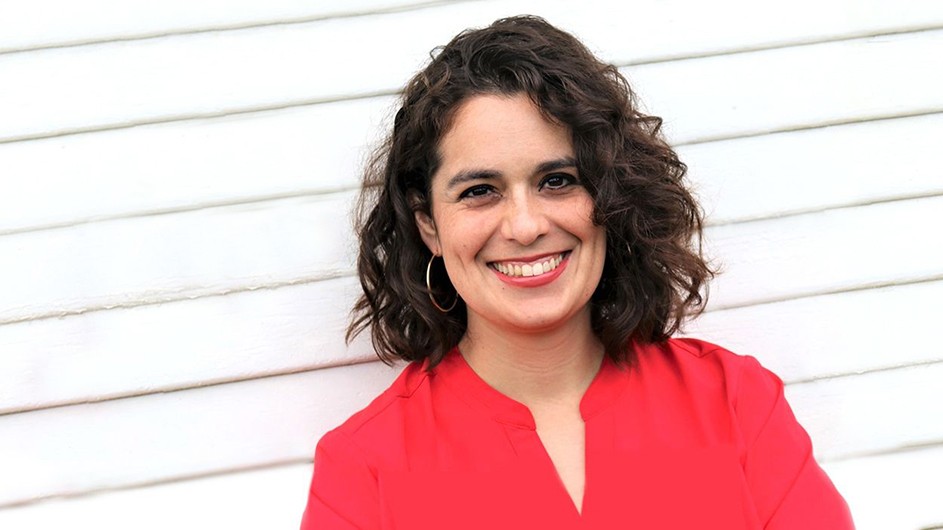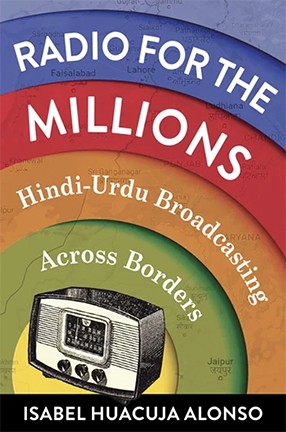How Radio Crossed Borders in the Indian Subcontinent
Isabel Huacuja Alonso’s “Radio for the Millions” traces the vitality of the medium in South Asia during the 20th century.

From news about World War II to the broadcasting of music from popular movies, radio played a crucial role in an increasingly divided South Asia for more than half a century. Radio for the Millions, by Professor Isabel Huacuja Alonso, who teaches in the Department of Middle Eastern, South Asian, and African Studies, examines the history of Hindi-Urdu radio during the height of its popularity from the 1930s to the 1980s, showing how it created transnational communities of listeners.
Alonso argues that despite British, Indian, and Pakistani politicians’ efforts to usurp the medium for state purposes, radio largely escaped their grasp. She demonstrates that the medium enabled listeners and broadcasters to resist the cultural, linguistic, and political agendas of the British colonial administration and the subsequent independent Indian and Pakistani governments. Rather than being merely a tool of nation building in South Asia, radio created links that defied state agendas, policies, and borders, and forged an enduring transnational soundscape, even after the 1947 Partition of India.
Alonso shares her insights about the book with Columbia News, as well as her book recommendations, what she’s teaching now, and who she might like to invite over for a meal.
How did you develop the idea for this book?
This project has been in the works for more than a decade. As is the case with many creative projects, there are several origin stories.
As a second-year PhD student, I proposed writing a dissertation on the Indian National Army and the Indian nationalist Subhas Chandra Bose, who sided with the Axis countries during World War II and broadcast frequently on the radio from Germany and Southeast Asia. I later realized that what interested me most about Bose was his use of media. He ends up in only one section of my book.
Another origin story starts a bit earlier, during my junior year of college, when I took a class on U.S. foreign policy after 9/11. I had originally proposed writing a paper for the class about U.S. foreign policy in Latin America, but then decided I wanted to explore something different. I asked the professor if I could change the paper topic to something concerning South Asia, and he said yes.
I didn’t know much about the region then, but I knew that the narrative I was hearing in the news about South Asia following 9/11 had to be wrong and incomplete, just as I knew that the narrative about the U.S.-Mexico border, where I grew up, advanced in the American media was also misguided. The paper I wrote for that undergraduate course was more influential in my life than I could have ever imagined at the time. In the years to come, I learned Urdu and Hindi, lived in India for several years, traveled to Pakistan, and now, almost two decades later, here is this book.
The final origin story requires a bit more imagination: I recently discovered—thanks to my 92-year-old grandmother’s superb memory—that my great-grandfather owned a little store in Mexico City where he sold and repaired radios, when my grandmother was a young child. I was able to trace a photograph of one of the radios that he sold, which had the original plaque with the store’s name, Casa de León, and address. That picture now hangs in my office. So maybe I was meant to write Radio for the Millions all along.

As a sound media historian, what current mode of sound do you think is as influential as radio once was?
There is a revival of radio now—in the form of podcasts and radio streaming—and I think that radio is as influential and important as it ever was, but in different ways. The contexts, like the technologies, are different. But sound media is very much alive. It is an exciting moment to be a radio historian. I’ve been thinking a lot about how interactive radio shows from the 1960s and 1970s that relied on listeners share some similarities with today’s podcast world, in terms of creating fans and fan culture.
What books have you read lately that you would recommend, and why?
On a whim recently, I picked up A Man’s Place, a novel by Annie Ernaux, the 2022 Nobel Prize in Literature winner. I didn’t expect to like it much, but I haven’t stopped reading her books since then. I recommend A Man’s Place and A Women’s Story. There is a crude honesty and a disavowal of nostalgia to her autobiographical writing that I find refreshing.
I also recently read All That She Carried: The Journey of Ashley's Sack by Tiya Miles, which blew me away. The book showcases the historian’s craft at its absolute best. It is at once tender and appalling.
What's on your 2023 reading list?
Some recent books that I have just ordered, and will be reading soon, I hope: Rumya Putcha’s The Dancer’s Voice: Performance and Womanhood in Transnational India; Salma Siddique’s Evacuee Cinema: Bombay and Lahore in Partition Transit, 1940–1960; and Andrew Simon’s Media of the Masses: Cassette Culture in Modern Egypt.
What are you teaching this spring?
The Core’s Contemporary Civilization II and Sound and Listening Cultures of South Asia, a fun, eclectic course. Another title for this class could be Can We Hear Past? While the class focuses on South Asia, we are thinking a great deal about what it means to listen to the past. What are the politics and possibilities/impossibilities of recreating past sounds?
Who would you invite to a dinner party, and why?
I think many intellectuals and writers are often best met through their writing. But I have thought quite a bit about how cool it would have been to meet some of the people that I have written about. I would love, for example, to meet the Punjabi singer and actress Noor Jehan, who died in 2000, and whose work and life story across South Asian borders have long captivated me.
I would also like to talk to my great-grandfather about his radio store. He might be surprised and pleased that his great-granddaughter also works in radio, in a very different way.